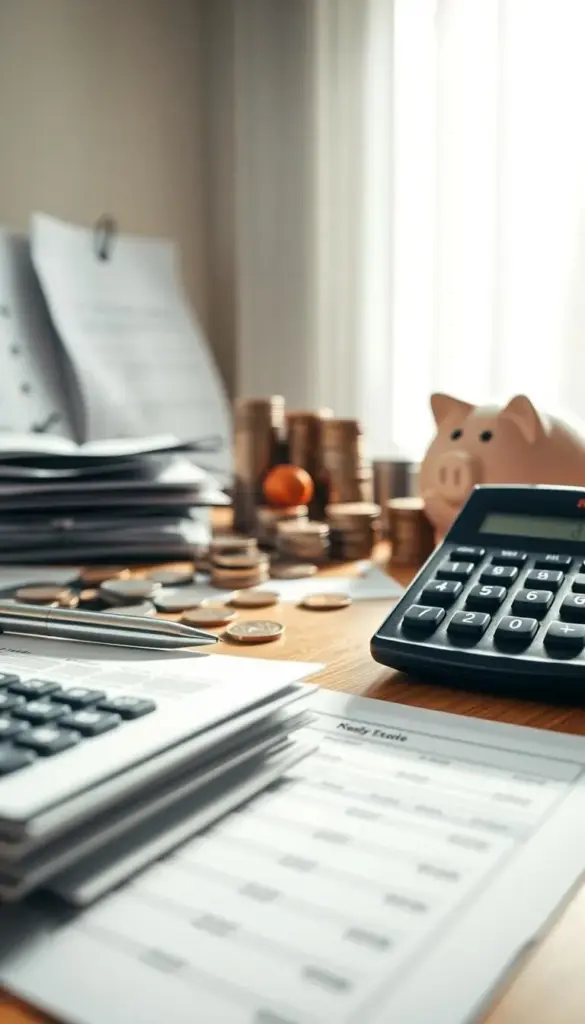Managing your money well is key to financial freedom. I’ve found that knowing and controlling important spending areas is essential. It’s vital for a good personal finance strategy.

By focusing on the right budget categories, you can greatly improve your financial health. Mastering these areas has changed the game for me. It helps me use my resources better and secures my financial future.
Key Takeaways
- Understand the importance of categorizing expenses for effective financial management.
- Identify key areas that impact your financial health.
- Develop a tailored personal finance strategy.
- Learn how to allocate resources efficiently.
- Achieve financial stability by mastering budget categories.
The Financial Freedom Blueprint
My journey to financial freedom started with learning about budgeting. I made a detailed financial plan to control my money and reach my goals. It wasn’t about cutting back; it was about making smart choices.
Why I Believe Budgeting Changes Everything
Budgeting changed my life. It helped me focus on what’s important, cut down on waste, and save for big things. This way, I feel more secure about my finances.
My Approach to Painless Budget Management
I keep my budget simple and flexible. I use apps and spreadsheets to track my spending. This lets me adjust my budget easily, keeping it a tool for freedom, not stress.
| Budgeting Strategy | Description | Benefit |
|---|---|---|
| 50/30/20 Rule | Allocate 50% towards necessities, 30% towards discretionary spending, and 20% towards saving and debt repayment. | Simplifies budgeting decisions |
| Zero-Based Budgeting | Assign every dollar a job, ensuring that every dollar is accounted for. | Reduces wasteful spending |
| Envelope System | Divide expenses into categories and allocate cash for each category. | Helps stick to budget |
Using these strategies, I’ve managed my money well. I’ve made real progress towards financial freedom.
Budget Categories to Master Your Finances
To take control of your money, it’s key to know the main budget categories. Understanding and managing these areas helps you make smart money choices. This leads to financial stability.
Essential Categories I Never Skip
When I make my budget, I always focus on certain categories. These are:
- Housing: rent/mortgage, utilities, and maintenance
- Food: groceries and dining out
- Transportation: vehicle costs, insurance, and public transportation
- Healthcare: insurance, medical expenses, and wellness
- Debt repayment: credit cards, loans, and other debt obligations
- Savings: emergency fund, retirement savings, and other savings goals
Tracking these categories helps me use my money wisely. It also helps me reach my financial goals.
How I Personalize Categories for My Lifestyle
I also make my budget fit my lifestyle. For instance, I have a category for entertainment and hobbies. This includes things like streaming services, concert tickets, and art supplies.
I use expense tracking tools to watch my spending. This lets me adjust my budget as needed. It keeps me on top of my finances and helps me use my money wisely.
Other categories I consider are:
- Pet expenses
- Travel
- Home improvement
- Personal development
By making my budget fit my unique needs, I create a budget that really works for me. It supports my financial health.
Housing: Conquering Your Largest Expense
As I worked on my finances, I found that housing costs were huge. But, I could save a lot by using smart money management techniques. This way, I could put more money towards my savings goals.
Rent vs. Buy: How I Made My Decision
Choosing between renting and buying a home was a big deal for me. I looked at my financial health, future plans, and the local market. Renting gave me flexibility, but buying seemed like a good long-term choice.
Utility Management Strategies That Saved Me Hundreds
I learned that small changes in how I used utilities could save a lot. Here are some tips that helped me:
| Utility | Savings Strategy | Estimated Savings |
|---|---|---|
| Electricity | Using energy-efficient appliances | $100/year |
| Water | Fixing leaks promptly | $50/year |
| Gas | Adjusting thermostat settings | $75/year |
Home Maintenance Planning Without Stress
To avoid surprise maintenance costs, I made a maintenance plan. This kept me ahead of repairs and replacements. It reduced stress and saved money.
By managing my housing costs wisely, I’ve made good progress towards my financial goals.
Food Budget Mastery: Eat Well for Less
Learning to manage your food budget is key to financial freedom. With a few simple steps, you can enjoy your favorite dishes without overspending.
Meal planning is a great way to control your food budget. It helps you avoid expensive takeout and cuts down on food waste.
My Weekly Meal Planning System
I plan my meals for the week first. I think about my schedule, what I like to eat, and what I already have at home. This makes a grocery list easy to follow.
Here’s how I plan my meals:
| Day | Meal | Ingredients |
|---|---|---|
| Monday | Grilled Chicken | Chicken breast, olive oil, salt, pepper |
| Tuesday | Vegetable Soup | Vegetables, broth, beans, tomatoes |
| Wednesday | Salad | Lettuce, vegetables, nuts, dressing |
Restaurant and Takeout Budgeting Without Guilt
Eating out can be convenient, but it’s expensive. I set a monthly budget for dining out and track my spending. This way, I can enjoy my favorite places without feeling guilty.
I allocate $200 a month for eating out. I use a budgeting app to keep track. It helps me stay on budget and enjoy dining out.

Reducing Food Waste to Save Money
Reducing food waste is another smart way to save money. By planning meals and using leftovers, you can cut down on waste.
Here are some ways I reduce food waste:
- Getting creative with leftovers
- Freezing food before it goes bad
- Composting food scraps
By using these strategies, you can eat well and save money. Mastering your food budget takes time and effort. But with the right approach, you can reach your financial goals.
Transportation Costs: Getting More Mileage from Your Dollar
To get more from our transportation budget, we need a smart plan. Looking back, I’ve found ways to cut down on costs.
Car Ownership: True Costs I Track
Car ownership comes with more than just monthly payments. I keep an eye on insurance, fuel, maintenance, and repairs. This helps me understand my total costs and plan my budget better.
Alternative Transportation Options I’ve Tried
Trying new ways to get around has really helped my wallet. I’ve used public transport, carpooling, and even biking for short trips. These choices save money and are better for the planet.
Commuting Strategies That Save Time and Money
Improving my commute has saved me time and money. I plan my route, avoid rush hours, and choose fuel-efficient options. These financial planning tips and budgeting strategies let me spend more on other important things.
Healthcare Planning: Protecting Your Wealth and Health
Healthcare planning is more than just insurance. It’s a full plan for staying well. I learned this as I managed my money. It’s key to keep both your wealth and health safe.
Insurance Selection: My Decision Framework
I’ve made a plan to choose insurance wisely. I look at several important things. These are:
- The level of coverage provided
- Premium costs and possible changes
- Deductibles and out-of-pocket costs
- Network providers and specialist coverage

Building My Medical Emergency Fund
Creating a medical emergency fund is vital. It’s a financial backup for unexpected medical bills. I aim to save 3-6 months’ worth of expenses.
Preventative Care Investments That Pay Off
Investing in preventative care has changed my life. Regular check-ups and screenings keep me healthy and save money. Some key investments are:
- Annual physical exams
- Recommended vaccinations
- Screenings for common health issues
By focusing on preventative care, I boost my health and cut down on future medical costs.
Debt Elimination: My Path to Financial Freedom
Dealing with debt was tough, but I found ways to tackle it. Getting rid of debt is key to financial freedom. I used several strategies to make it happen.
How I Prioritize Multiple Debts
I sorted my debts by interest rates and urgency. I paid off the high-interest ones first. This way, I saved money on interest.
Creating My Debt Payoff Timeline
I made a debt payoff plan based on my income and expenses. I set aside a certain amount each month for debt. This helped me see my progress and stay motivated.
Avoiding New Debt While Paying Off Old Ones
To not get new debt, I followed strict rules on how I spent my money. I also saved for emergencies. This way, I didn’t need to take on new debt.
These steps helped me clear my debt and get closer to financial freedom. My story proves that with the right plan and discipline, anyone can beat debt and secure a better financial future.
Savings and Investments: Building Future Wealth
My journey to financial freedom has shown me the value of a solid savings and investment plan. By focusing on savings and making smart investment choices, I’ve built a strong financial base.
My Emergency Fund Strategy
Keeping an easily accessible savings account, or emergency fund, is key to my financial plan. This fund should cover 3-6 months of living costs for unexpected events like job loss or medical emergencies.
- Determine your monthly essential expenses.
- Set a target amount for your emergency fund based on these expenses.
- Automate monthly transfers to your savings account until you reach your target.
This safety net has brought me peace of mind. It lets me take smart risks in my career and investments.
Retirement Accounts I Prioritize
Planning for retirement is vital in my savings and investment strategy. I focus on using tax-advantaged retirement accounts to boost my savings.
“The biggest investment risk is not knowing what you’re doing.” – Warren Buffett
My strategy includes:
- Contributing to a 401(k) or similar employer-sponsored plan, taking advantage of employer matches.
- Using Individual Retirement Accounts (IRAs) for extra savings.
- Diversifying my retirement portfolio across different asset classes.
Short-Term Savings Goals That Keep Me Motivated
I also have short-term savings goals to keep me on track. These might be for a down payment on a house, a vacation, or a big purchase.
Breaking down big goals into smaller, reachable targets keeps me motivated. I see real progress in my savings journey.
To reach these goals, I:
- Set specific targets and deadlines.
- Open separate savings accounts for each goal to keep funds organized.
- Regularly review and adjust my progress.
By combining a strong emergency fund, prioritizing retirement savings, and focusing on short-term goals, I’ve built a solid savings and investment strategy. This supports my overall financial health.
Lifestyle and Entertainment: Enjoying Life While Saving
Finding a balance between saving and living is key to a happy life. As I manage my finances, I’ve learned that saving money doesn’t mean missing out. It’s all about budgeting wisely.
Finding My Balance Between Saving and Living
I focus my spending on what truly matters to me. This means setting aside money for fun activities and experiences. At the same time, I keep my long-term financial goals in mind. This way, I can enjoy life’s moments without hurting my wallet.
Subscription Audit: How I Cut Costs Without Sacrifice
Regularly checking my subscriptions has really helped my budget. I look at services like streaming and gym memberships to see if they’re worth it. By canceling or getting better deals, I save money for more important things or to grow my savings.
Free and Low-Cost Entertainment I Love
Entertainment doesn’t have to cost a lot. I love doing things like hiking, cooking at home, or going to local events. These activities save money and help me connect with others, making memories that last.
By using these tips, I can live life to the fullest while keeping my finances in check. It’s all about finding that perfect balance for a happy and fulfilling life.
Tech Tools That Transformed My Budget
Using the right tech tools has made budgeting easier and less stressful. It has helped me save more money. Now, managing my finances is simpler, thanks to technology.
Apps That Changed My Financial Life
Several apps have been key in tracking my expenses and reaching my financial goals. Some of my top picks are:
- Mint: A detailed expense tracker that shows my spending habits clearly.
- YNAB (You Need a Budget): A budgeting app that assigns jobs to every dollar, helping me manage my finances.
- Personal Capital: A tool that tracks my expenses and helps me invest smartly.
Spreadsheet Systems for Different Financial Goals
Apps are great for daily expenses, but I use spreadsheets for long-term goals. I have spreadsheets for saving for a house, retirement, and emergencies.
How I Automate My Budget to Save Time
Automation has changed my budgeting game. I set up automatic transfers to save and invest regularly. This saves me time and keeps me on track with my goals.
By using the right apps, spreadsheets, and automation, I’ve built a strong budgeting system. It’s both effective and efficient.
Conclusion: Your Journey to Financial Mastery
Mastering your finances is a journey that needs patience, discipline, and the right strategies. By using effective money management and income allocation, you can reach your savings goals. This will help you build a strong personal finance strategy.
Understanding and managing key budget categories is key to financial freedom. By taking a personalized approach to financial planning, you can make big strides towards your goals.
Now, you know the essential budget categories and how to manage them. It’s time to take charge of your financial future. Start by checking your current financial situation, setting realistic savings goals, and creating a personal finance strategy that fits you.
By doing this, you’ll be on your way to financial mastery and a brighter future.






